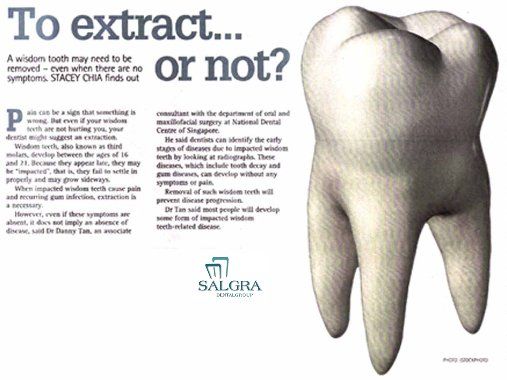by Salgra Dental Group – Pembroke Pines, Florida
Wisdom teeth usually emerge from the gum between the ages of 17 and 24. They are the last of the molar teeth, which are the large grinding teeth at the back of the mouth.
Some people never develop wisdom teeth and others have up to four – one in each corner of the mouth. Wisdom teeth usually cause no problems.
They are described as impacted when there is not enough space for them at the back of the mouth. Impacted wisdom teeth can cause pain, swelling, infection or damage to the teeth next to them. If the gum around the wisdom tooth is swollen the jaw may become stiff and sore. Infection at the back of the mouth can cause bad breath and a bad taste.
The surgical removal (extraction) of one or more wisdom teeth can relieve these problems. However, removing the wisdom teeth does not usually improve crookedness or crowding of other teeth.
If you have problems such as infection, cysts, tooth decay or gum disease around a wisdom tooth you may think about having it removed. If you have impacted wisdom teeth that are not causing problems, you don’t need to have them removed.
When should wisdom teeth be removed?
The following symptoms may indicate that the wisdom teeth have erupted and surfaced, and should be removed before they become impacted — meaning, the teeth have surfaced and have no room in the mouth to grow. However, each individual may experience symptoms differently. Symptoms may include:
- Pain
- Infection in the mouth
- Facial swelling
- Swelling of the gumline in the back of the mouth
Most oral health specialists will recommend an immediate removal of the wisdom teeth, as early removal will help to eliminate problems, such as an impacted tooth that destroys the second molar. According to the American Academy of General Dentistry, third molar impaction is the most prevalent medical developmental disorder.
What problems are often associated with impacted third molars?
- Bacteria and plaque build-up
- Cysts development (a fluid-filled sac)
- Tumor development
- Infection
- Jaw and gum disease

